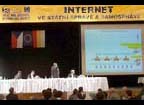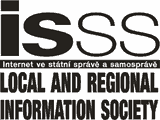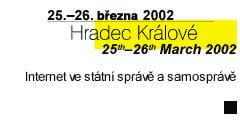|
|
|

 1st virtual vernissage
1st virtual vernissage

|
|
|
Congress Centre ALDIS, Hradec Kralove, Czech Republic
Press Release
03/26/2002, 20:00
Memorandum of Understanding
At the common meeting of ELANET, ERIS@, TeleCities with
representatives of candidate countries local government associations
a Memorandum of Understanding was adopted.
1. Background
Reiterates that
- With the launch of the eEurope+ Action Plan "A co-operative effort to implement the
Information Society in Europe" at the occasion of the Göteborg Summit on 16 June
2001, the Heads of Government of the EU Candidate Countries have given a joint, political
commitment to embrace the challenges associated with the knowledge-based economy in a
joint effort to modernise our economies and provide potential benefits to our citizens,
- The Candidate Countries underlined full subscription to the ambitious goal agreed by the
EU leaders at Lisbon Summit on 23-24 March 2000 for "Europe to become the most
competitive and dynamic knowledge-based economy in the world" and to outline that the
challenge for the EU Candidate Countries is therefore to ensure that this political
objective can be met and moreover, it offers an opportunity to strengthen co-operation
with the EU-15 in an area of importance to the whole of Europe,
- The development of e-government and e-governance in the CEEC countries requires
interaction at all government levels and strong European co-operation. An inclusive
Information Society that prevents Europe from any possible form of digital divide should
stimulate good and continuous benchmarking initiatives between best practices throughout
Europe. It is most important that these benchmarking actions are planned and supported at
European level through tools and programmes in which the regional and local dimension is
adequately present, since municipalities, provinces and regions can greatly benefit from
it to reengineer their organisations and to provide better and wider services based on the
new information and communication technologies to their citizens.
- In particular, eEurope+ recognises that there is a basic need to ensure that all
citizens are offered the possibility of access to affordable communications services in
order to avoid a digital divide,
- Heads of Government of the Candidate Countries expected to call for assistance of all
partners in the implementation of the plan and reflecting the need for confirming the
European cities and regional position as the major stakeholders for the citizens
prosperity and welfare and the material role ICT has been playing in recent years in local
and regional policy, the following Candidate Countries' Associations of Towns and
Communities and Regions and their organisations agree to establish closer links in order
to shape their ways to the Information Society at the regional and local level as a means
to promote their economic and social development through the achieving goals of the Action
Plan eEurope+.
2. Objectives
The overall objectives of the Candidate Countries' Local and Regional Government
Organizations' Network (LOGONet+) will be
- Efficient mutual co-operation of these organisations and establishment of their
continuous dialogue at the national and international level
- Strengthening of the professional relationship with similar organisation in the European
Union
- Identification of co-operation opportunities through the Committee of Regions, the
Council of European Municipalities and Regions, and other institutions whenever possible
- Institutionalisation of the advocacy channel for local and regional governments to the
European Union
Support of the national associations:
- To be provided for actions which tackle the specific situation on the local and regional
level in their countries
- To give increased priority the development of information infrastructure and projects,
especially in less-favoured regions
- To support the active role and participation of disadvantaged groups and areas
- To contribute to a transformation of the organization of the public sector for improving
public services, making them faster, as well as more accessible and responsive, and more
importantly by more transparent and interactive government to stimulate the participation
of citizens in the democratic process
- To include proper and stable partnerships with the private sector.
3. Commitment
The member associations will, so far as is possible, give a commitment to
- Follow the priority objectives and targets of eEurope+ Action Plan but provide for
actions that address the specific situation of their countries
- Support member local government in the development and implementation of their
information society strategies and action plans
- Raise awareness of the information society and promote universal access in the regions
to ICT applications and services in order to stimulate regional development and growth,
safeguard and create an employment, and promote social inclusion
- Develop strong working relationships between associations and European Institutions
- Support membership of LOGONet+ in European networks such as ELANET, eris@, TeleCities
and others
- Support member associations in preparation and coordination of common approach to the
new projects of EU programmes such as 6th Framework Programme, eContent Programme, IDA
(when eligible) and others
- Provide European Commission with analysis of the development of information society on
the local and regional level in candidate countries and with benchmarking of the stage of
implementation of the eEurope+ Action Plan on local and regional level
- Report on EU programmes, initiatives and funding opportunities to disseminate
experiences through regular conferences, workshops and websites
- Share experience, results and best practises among local authorities in order to
facilitate a local and global process of information society learning.
Member organisations are committed to a long-term approach to this initiative and will
seek the support of the European Commission in this regard.
Hradec Kralove, 26th March, 2002
|




